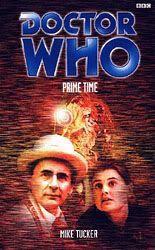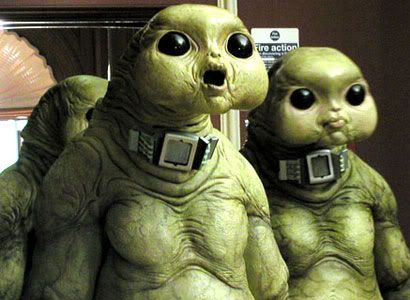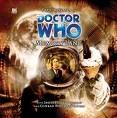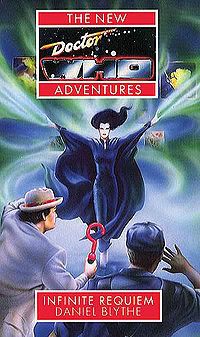 An audio adventure featuring the Sixth Doctor and Evelyn
An audio adventure featuring the Sixth Doctor and EvelynWritten by Paul Sutton and directed by Gary Russell
Polarity Rating: 1 out of 5
The problem with randomly picking stories to review is that you obviously do not listen to them in order. Big Finish often releases three or four stories in an arc, and although they may be enjoyed independently, there are elements that overlap in consecutive stories (see my review of The Key 2 Time: The Destroyer of Delights as an example). Another issue is that you can pluck a story from Big Finish's library and learn something about a companion you're not very familiar with, which I think may have been part of my problem with this one.
The last story I listened to (and enjoyed) featuring Dr. Evelyn Smythe was her first appearance in The Marian Conspiracy. There she was presented as a hard-as-nails history lecturer capable of standing up to the Sixth Doctor's usual bravado. I liked her, and found it was refreshing to have an elderly companion, not to mention someone a little reminiscent of Tegan, albeit a bit less annoying. In the opening of Arrangements for War, Evelyn is recovering from a loss she suffered in the previous story, and she later falls in love with a gentleman who proposes to her. It was a sudden change from what I had perceived the character to be, and I suspect there has been a lot of character development since The Marian Conspiracy.
Hoping to give Evelyn's emotions a rest, the Doctor brings her to the planet Vilag, where two rival countries are about to celebrate the marriage of Princess Krisztina and Prince Victor. The marriage is an arranged one, as well as a political move to make peace between the two nations. Obviously there are some dissenters, the most prominent being Plenipotentiary Suskind, but the Doctor assures us all will be well again in a couple weeks time when the planet will be invaded by an alien race which will be defeated by all the nations on Vilag joining together. Their victory will solidify their alliance and peace will reign eternal.
I despise when I ask people how a film or television show was and their one-word review is something like "boring" or "stupid." But you cannot imagine how tempting it is to simply slap this CD with a "boring" sticker and call it a day. The first episode consists of the Doctor's consoling Evelyn and giving her the usual "I can't change the bad things that have happened" lecture, followed by talking about preparations for the upcoming wedding on Vilag. Then the Doctor puts his foot in it when he accidentally talks Krisztina out of marrying Victor and sticking with her true boyfriend, Corporal Reid. This means, of course, that the marriage that would mark the first step toward peace may be called off, so that means the Doctor has inadvertently changed their history. And that, my friends, is the stunning cliffhanger at the end of the first episode.
It didn't get better with the second episode. The aforementioned romance between Evelyn and Governor Rossiter continues, and the Doctor tries to dance around the fact that he's changed history by trying to get the wedding back on track. Which brings me to a interesting point: not long ago I was watching "Pyramids of Mars," in which the Doctor and Sarah are as nonchalant as ever to bring up the fact that they're time travelers to save the planet from Sutekh, yet in this story everything could have been averted if the Doctor had just come out and told the damn truth! I found this relentlessly irritating, which was doubled by the Doctor's postulations on love. Frankly I couldn't believe this was a Doctor Who story, not to mention a Sixth Doctor story. They even have the Doctor secretly passing love letters between Krisztina and Reid, as if he sits between them in study hall.
There are a number of other implausible happenings, including the imprisonment of the Doctor and Evelyn for reasons unknown (or perhaps I just wasn't paying attention, which was a task in and of itself). We are treated to voice overs of newscasters to explain the passing of time. Eventually the alien invaders arrive and the least impressive invasion in Doctor Who history ensues. The story concludes with the Doctor suddenly realizing that his actions do have consequences, and it's sort of the mirror image of that scene at the conclusion of "Waters of Mars."
Perhaps I'm not the right person to review this story. Perhaps I was just expecting something a little more exciting like the stuff Big Finish has been churning out lately. There was very little in this story that compelled me...heck, I don't think there was anything in it that compelled me. Mind you, the acting was fair. I have a feeling that there are people out there who are passionate about this story, and I'll bet anything they're the same folks who loathe "Love and Monsters," a story that's particularly close to my heart.
This is the first story I've heard by Paul Sutton. One of his other works, No More Lies, is currently sitting on my bookshelf, still in its plastic wrap. After listening to Arrangements for War, I suspect No More Lies will maintain its plastic status. I'm sorry, Paul Sutton, but I've read some of the other reviews out there and some fans seem to like this type of story. Obviously, I don't.
I like my Doctor Who to have a little more action, cliffhangers in which the characters are in danger, or some plot that doesn't seem to have been pulled from a soap opera set in a magical land of fairy tales. Even when the story did head in that direction (the alien invasion), it was so slapdash and quickly over that I hardly even noticed it. The conclusion of the story seems as long as The Return of the King, with the Doctor philosophizing on how his travels have changed so many lives, often for the worse, as Evelyn pats him on the hand with hollow reassurances. This is not something I can see the Doctor allowing himself to bring to the surface, particularly the Sixth Doctor. My Sixth Doctor is arrogant, funny, and sometimes a little too quick to open his mouth. This was not the same Doctor or the same Evelyn that I really enjoyed in The Marian Conspiracy.
I probably will not be listening to Arrangements for War ever again, although I will keep it for the sake of being a completest. I do have a friend I will recommend it to, though, and I truly hope that he gets more out of it than I did. It is not, I dare say, a complete waste.





